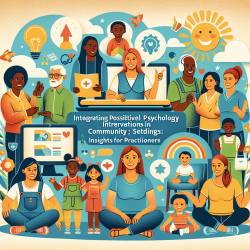In the realm of special education, parent-implemented telepractice autism interventions are gaining traction. A recent case study titled "Parent-Implemented Telepractice Autism Intervention: A Case Study of Maintenance and Generalization" sheds light on the long-term efficacy of these interventions. The study, published in the International Journal of Environmental Research and Public Health, explores how parents can maintain and generalize communication strategies over time and across different children.
Key Findings from the Study
The study focuses on a mother, Mediha, who applied learned communication strategies from a previous intervention with her older son, Ali, to her younger son, Rami, four years later. The findings revealed:
- High Fidelity Implementation: Mediha maintained high-fidelity use of the strategies over four years and successfully generalized them to her younger son.
- Increased Confidence: Despite her technical skills, Mediha sought further support to ensure she was applying the strategies correctly and naturally.
- Emotional Support Matters: Continuous emotional support and feedback were crucial for Mediha to feel confident and effective in her role.
Practical Implications for Practitioners
The study offers several practical takeaways for practitioners in online therapy and special education:
- Program for Generalization: Ensure that strategies are designed to be generalizable across different settings, routines, and individuals.
- Continuous Support: Provide ongoing coaching and emotional support to parents, even if they have previously mastered the strategies.
- Tailored Interventions: Customize interventions to meet the unique needs of each child and family, taking into account their specific circumstances and challenges.
Encouraging Further Research
While the study provides valuable insights, it also highlights the need for further research in this area. Future studies should explore:
- Long-Term Maintenance: Investigate the factors that contribute to the long-term maintenance of learned skills.
- Broader Contexts: Examine the generalization of strategies across various contexts and settings.
- Emotional and Social Validity: Assess the emotional and social impacts of these interventions on families.
Conclusion
The case study underscores the importance of both technical skill maintenance and emotional support in parent-implemented telepractice autism interventions. Practitioners should focus on creating generalizable strategies and providing continuous support to parents to ensure long-term success.
To read the original research paper, please follow this link: Parent-Implemented Telepractice Autism Intervention: A Case Study of Maintenance and Generalization.










